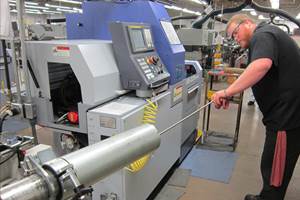Communication: Motivating Employees To Work In The Best Interest Of The Business
Fair treatment is all most employees ask of their employers. Showing both family and non-family employees what is fair and having open lanes of communication allow for a healthy exchange of what constitutes equitable treatment. Effective communication between management and employees on important issues, such as compensation and firm strategy, needs to take place to maintain a motivated and enthusiastic workforce.
Fair treatment is all most employees ask of their employers. Showing both family and non-family employees what is fair and having open lanes of communication allow for a healthy exchange of what constitutes equitable treatment. Effective communication between management and employees on important issues, such as compensation and firm strategy, needs to take place to maintain a motivated and enthusiastic workforce.
Communicate What Constitutes Fair Compensation
The power of having a compensation policy in writing eliminates much of the uncertainty that accompanies salary reviews. To the greatest extent possible, terms for bonuses, regular wages, fringe benefits and vacation policy should be expressed for family employees just as for non-family employees. This is not to say every penny of compensation is to be accounted for, but even qualitative guidelines are better than no guidelines at all. Simple examples could base some incentive compensation on the profitability of the business or on more subjective criteria such as customer satisfaction.
Regularly scheduled reviews should apply to family members as well as non-family members. Reviewing a sibling's job performance may seem strange, but a candid assessment of job performance can take place because the review provides a setting where family members can see each other as fellow employees. Because both parties understand the purpose of the exercise, agendas are clear, and improvements can be suggested in a constructive manner. This is a much better forum to voice grievances than having heated arguments behind closed doors, at family gatherings, or even worse, in front of non-family employees or clients.
Each person has an idea of his or her worth to an enterprise. When those expectations are not met, the disappointment can leave broken businesses and hard feelings between family members. A good starting point for compensation levels could be to determine the fair market value of a family member's services to the business. What would a non-family member in a similar position earn? At a minimum, this allows a third party, the labor market, to remove some of the mystery behind what is a "fair" wage. It also lessens the likelihood of resentment that may build with non-family employees; it reinforces good behavior by rewarding performance.
This type of system can also nudge family members who contribute less out of the business. While this may be uncomfortable for those who grew up in the business, they could feel confident that moving outside will not result in lower compensation for the same services—the feelings of being trapped or restricted do not enter into the picture. This is best both for the business and for family members no longer willing to act in the business' best interest.
Giving Ownership By Communicating Goals
Setting attainable goals is key to having a motivated workforce. While non-family employees would like to have equity ownership positions in the family business, an employee's pride is itself a source of "ownership." Using that ownership by harnessing the power behind everyone's sense of accomplishment after a job well done will help your business more than simply paying more to your employees will. Whether goals are measured in revenues, levels of customer satisfaction or production, they need to be made public to employees and should be quantifiable where possible.
With the meeting of objectives, the spoils need to be shared with those who make it possible. Small victories should lead to larger victories, building confidence. Workers need to have hope and a proper reward system to continue to give the best for the business. This applies to family members as well, though the reward, of course, is the ongoing success of the business. For non-family members, the process gives them a taste of what it's like to be in an ownership position—the sacrifices required and the rewards available.
Giving employees reason to believe tomorrow will be a better day is what will optimize performance. Without hope for a better future, the motivated employees will seek situations that offer reasons to be optimistic. These are probably the employees that are most valuable to the organization, so have them channel their energies into improving the business instead of looking for other employment opportunities.
Communicating the objectives of the owners is vital to keeping the workforce motivated. Is the business managed for growth, or is the business in harvesting mode? What can employees expect in terms of reinvestment into the business? Nothing good can come of a situation where an employee expects the business to be "run like a business," instead of simply serving to meet family owners' economic needs, Even though that may be the ultimate objective of the enterprise, this should be out in the open for both family and non-family employees.
Listen To Your Employees
Completing the feedback loop by listening to what employees are saying is critical to the communication process. While soliciting input from employees is often a good first step, too often their input is not acted upon. The discouragement this may cause can lead to feelings that the owners are just giving the appearance of interest when there really is none. Again, employees need to have hope—hope that they can make a difference and hope that input provided can effect change. Of course, making employees accountable for suggestions that are acted upon is just as important as soliciting their opinions. Power to implement needs to be accompanied by the responsibility for taking those actions, just as responsibility should lie with the employees who have the power to make decisions. Otherwise, the business will suffer from the added frustration employees feel for taking the fall for someone not under their control.
Related Content
Training Is More Than a Skills Upgrade
Training is more than a skills upgrade. Training is a process that creates a virtuous cycle for your performers, culture and shop. Why do we train? Why do we need to train?
Read More6 Tips for Training on a Swiss-Type Lathe
There are nuances to training a person to effectively operate a Swiss-type lathe. A shop I visited a while back offers some suggestions.
Read MoreJob Candidate Questions and What They Tell Us
Individuals who ask thoughtful, original questions in the interview set themselves apart.
Read More2023 Emerging Leaders Strengthen Their Staffs, Solve Problems
Superb critical thinking, top-notch leadership skills and a passion for building a strong team are a few of the common traits held by this year’s five Production Machining Emerging Leader award winners.
Read MoreRead Next
Do You Have Single Points of Failure?
Plans need to be in place before a catastrophic event occurs.
Read More5 Aspects of PMTS I Appreciate
The three-day edition of the 2025 Precision Machining Technology Show kicks off at the start of April. I’ll be there, and here are some reasons why.
Read MoreA Tooling Workshop Worth a Visit
Marubeni Citizen-Cincom’s tooling and accessory workshop offers a chance to learn more about ancillary devices that can boost machining efficiency and capability.
Read More











.jpg;maxWidth=300;quality=90)










